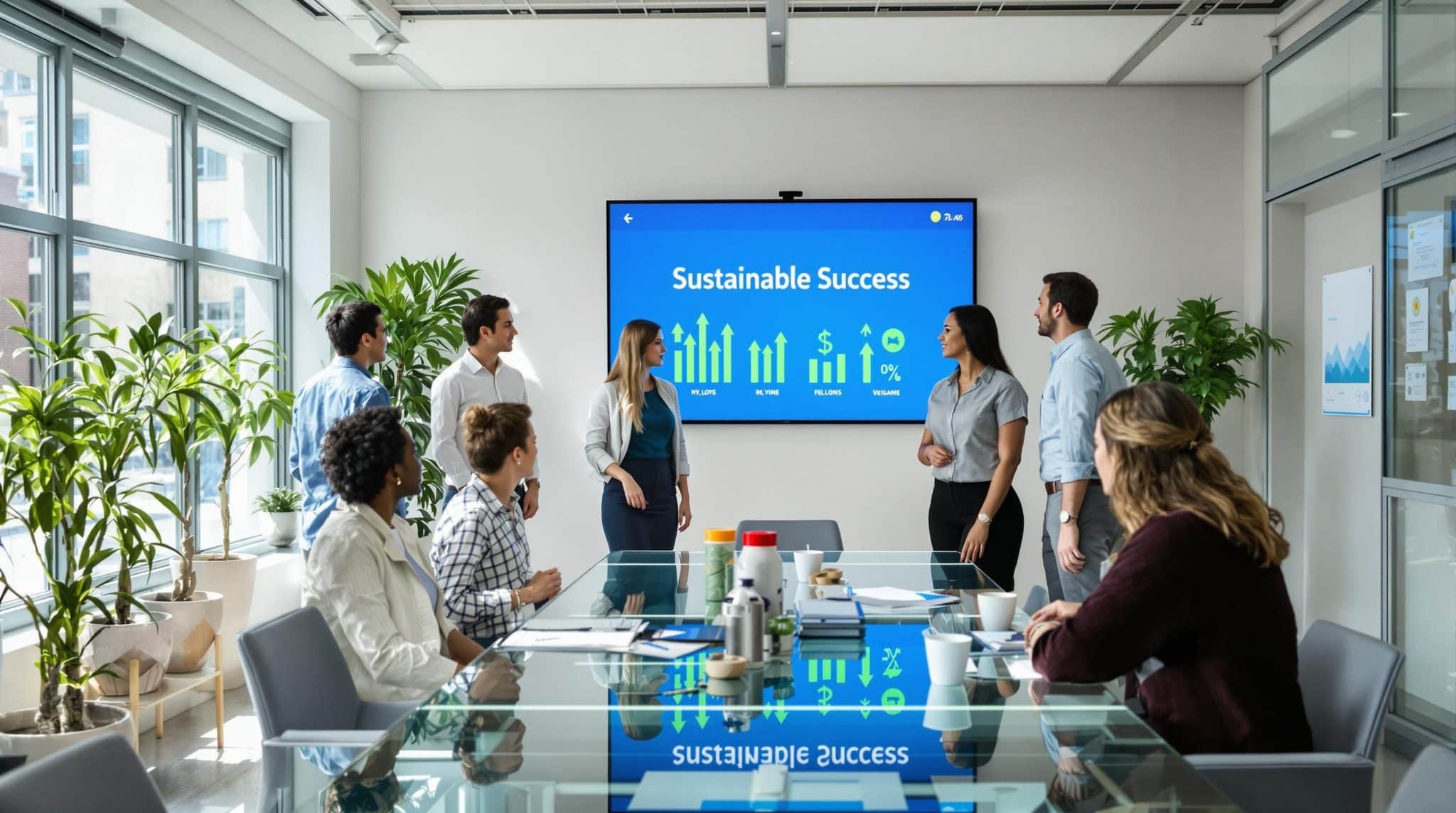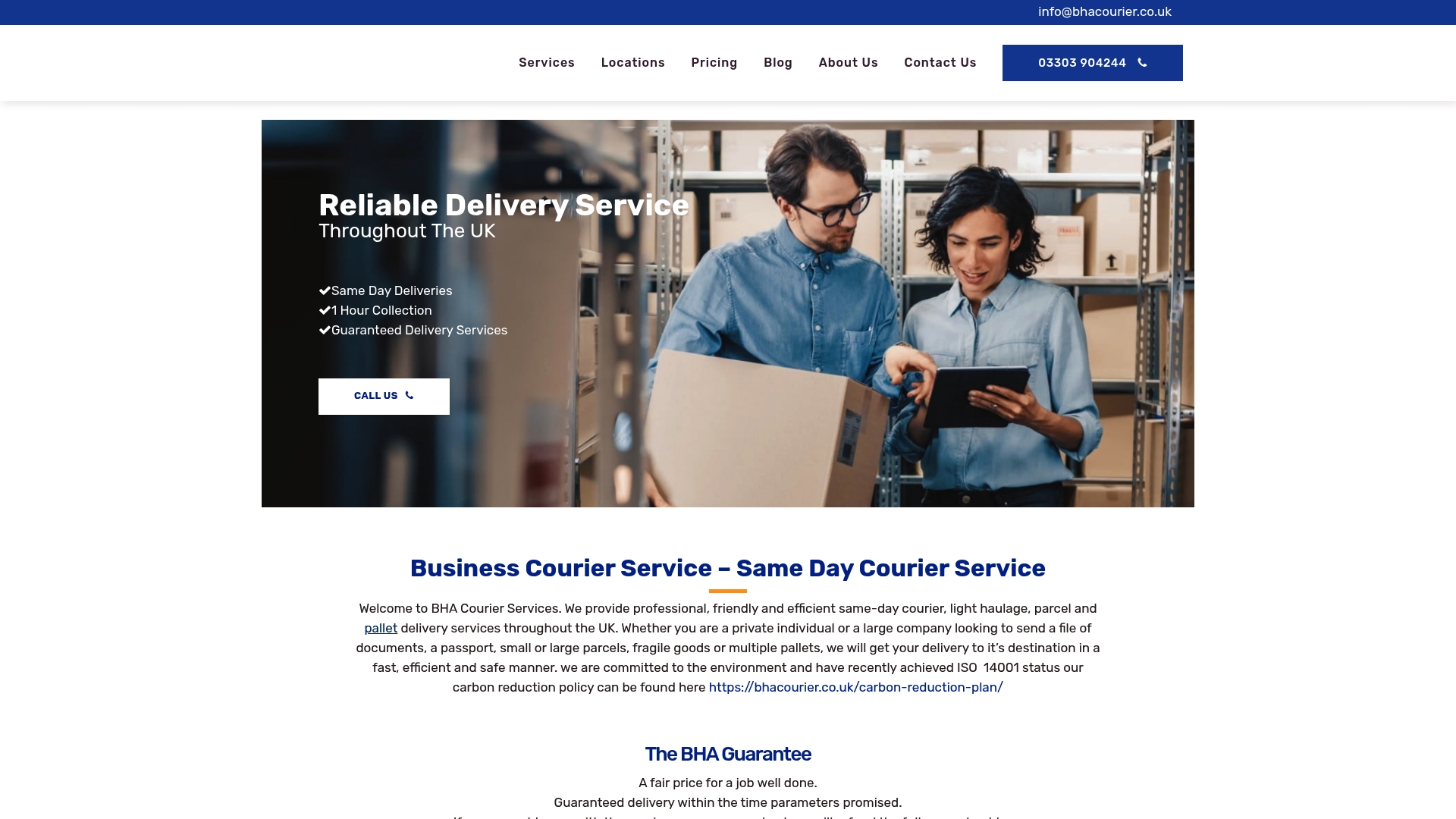
25 Jul Best Business Sustainability Practices for UK Success 2025
Business sustainability is rapidly becoming the standard for UK companies as the pressure to act on climate and ethics intensifies. Yet, most imagine sustainability means high costs or complicated red tape. In reality, climate-related investments are now six times more likely to increase company revenue, showing that green strategies have quietly become one of the sharpest tools for business success in 2025.
Table of Contents
- Why Business Sustainability Matters In The Uk
- Easy Steps To Adopt Sustainable Practices
- Success Stories From Uk Businesses
- Tools And Resources For Sustainable Growth
Quick Summary
| Takeaway | Explanation |
|---|---|
| Sustainability is a key competitive advantage | UK businesses must integrate sustainability to attract talent and enhance brand reputation. |
| Develop a comprehensive sustainability strategy | Begin with audits and measurable goals to track progress and effectiveness in sustainability initiatives. |
| Innovate in supply chain management | Focus on transforming supply chains to minimise environmental impacts and promote ethical practices. |
| Leverage technology for sustainability | Utilize tools like AI and IoT to optimise resources and reduce carbon footprints effectively. |
| Commit to continuous improvement in sustainability | Adopt an ongoing, proactive approach to sustainability, viewing it as a journey rather than a destination. |

Why Business Sustainability Matters in the UK
Business sustainability has transformed from a peripheral concept to a critical strategic imperative for UK companies in 2025. The landscape of corporate responsibility has fundamentally shifted, demanding comprehensive approaches that balance economic performance with environmental and social considerations.
Economic Drivers of Sustainability
The economic rationale for business sustainability is becoming increasingly compelling. According to PwC’s 2025 report, climate-related investments are now six times more likely to generate increased revenue for businesses. This statistic underscores a profound transformation in how companies perceive sustainability not as a cost centre, but as a strategic opportunity for growth and innovation.
UK businesses are recognising that sustainable practices are no longer optional. They represent a fundamental requirement for long-term competitiveness. Companies that integrate robust sustainability strategies can attract better talent, enhance brand reputation, and access new market opportunities. The financial implications are significant: organisations demonstrating strong environmental, social, and governance (ESG) credentials often enjoy lower capital costs and higher investor confidence.
Environmental and Social Responsibility
Research from the University of Nottingham reveals that over 80% of UK organisations now consider sustainability crucial to their operational strategy. This widespread commitment reflects a deeper understanding that businesses play a pivotal role in addressing global challenges such as climate change, resource scarcity, and social inequality.
Modern consumers and investors are increasingly sophisticated, demanding transparency and genuine commitment to sustainable practices. They scrutinise corporate behaviour beyond financial performance, evaluating companies based on their environmental impact, social contributions, and ethical standards. This shift has compelled businesses to develop more holistic approaches that integrate sustainability into their core business models.
Strategic Sustainability Implementation
Successful business sustainability practices require a multifaceted approach. Companies must develop comprehensive strategies that address environmental protection, social responsibility, and economic viability. This involves implementing circular economy principles, reducing carbon emissions, investing in renewable energy, promoting diversity and inclusion, and creating transparent supply chains.
The most effective sustainability strategies are those that view these initiatives not as compliance requirements, but as opportunities for innovation, efficiency, and competitive differentiation. By embedding sustainability into their DNA, UK businesses can create resilient, future-proof organisations that can navigate increasingly complex global challenges.
As the business landscape continues to evolve, sustainability will remain a critical determinant of organisational success. Companies that proactively embrace these principles will be best positioned to thrive in an increasingly complex and interconnected global economy.
Easy Steps to Adopt Sustainable Practices
Adopting sustainable business practices requires strategic planning and deliberate implementation. UK companies are increasingly recognising that sustainability is not just an environmental responsibility but a critical competitive advantage in the modern business landscape.
Developing a Comprehensive Sustainability Strategy
Creating an effective sustainability strategy begins with comprehensive assessment and goal setting. According to Financial Times research, businesses that proactively adopt sustainable practices can achieve significant cost savings, operational efficiency, and long-term growth.
Key steps in developing a robust sustainability strategy include:
- Conduct a Sustainability Audit: Thoroughly evaluate current operational practices, identifying areas of environmental impact and potential improvement.
- Set Measurable Goals: Establish clear, quantifiable sustainability targets aligned with scientific climate recommendations.
- Create Accountability Mechanisms: Develop transparent reporting systems to track progress and maintain organisational commitment.
To help clarify the practical steps for implementing sustainable practices, the following table summarises key actions organisations can take at each stage:
| Step | Description |
|---|---|
| Conduct a Sustainability Audit | Evaluate operational practices to find environmental impact and areas for improvement |
| Set Measurable Goals | Align sustainability targets with scientific and industry recommendations |
| Create Accountability Mechanisms | Implement transparent reporting to track progress and sustain commitment |
| Supply Chain Transformation | Redesign supply chains to minimise impact and select sustainable suppliers |
| Resource Efficiency | Introduce energy-saving technologies and promote circular economy principles |
| Carbon Footprint Reduction | Measure, track, and invest in renewable energy and carbon offset initiatives |
Building Sustainable Corporate Governance
Reuters sustainability experts recommend three critical approaches for embedding sustainability into corporate governance:
- Director Education: Implement specialised sustainability training programmes for board members to enhance understanding of environmental challenges and opportunities.
- Strategic Recruitment: Actively recruit board members with specific sustainability expertise and diverse perspectives on environmental issues.
- Stakeholder Engagement: Maintain ongoing dialogue with employees, investors, and external sustainability experts to stay informed about emerging trends and expectations.
Practical Implementation of Sustainable Practices
Translating sustainability strategies into actionable practices requires a multifaceted approach. Financial Times research highlights the importance of developing practical frameworks that address specific industry challenges.
Practical steps for implementation include:
- Supply Chain Transformation: Assess and redesign supply chains to minimise environmental impact, prioritising suppliers with strong sustainability credentials.
- Resource Efficiency: Implement energy-efficient technologies, reduce waste, and promote circular economy principles within the organisation.
- Carbon Footprint Reduction: Develop comprehensive carbon measurement and reduction strategies, including investment in renewable energy and carbon offset programmes.
Successful sustainable business practices require ongoing commitment, continuous learning, and adaptive strategies. By approaching sustainability as a dynamic, integrated aspect of business operations, UK companies can drive meaningful environmental change while maintaining competitive advantage.
The journey towards sustainability is not about perfection but consistent, intentional progress. Businesses that embrace this approach will be best positioned to thrive in an increasingly environmentally conscious global marketplace.
Success Stories from UK Businesses

UK businesses are increasingly demonstrating that sustainability and profitability can coexist harmoniously. These success stories showcase innovative approaches that balance environmental responsibility with economic performance.
Transformative Corporate Sustainability Models
Unilever’s recent strategic approach exemplifies a pragmatic sustainability framework. Under CEO Hein Schumacher’s leadership, the company has shifted towards ‘realistic sustainability,’ focusing on fewer but more ambitious sustainability goals. This approach demonstrates that corporate environmental commitments can be both meaningful and strategically sound.
By prioritising targeted, impactful initiatives, Unilever has shown that sustainability is not about pursuing every possible green project, but about making strategic choices that generate genuine environmental and business value. Their model encourages other UK businesses to adopt more focused, intentional sustainability strategies.
Ethical Business Practices and Profitability
Research from the University of York highlights that companies adhering to ethical business practices can achieve sustained profitability. The Good Business Charter’s research reveals that integrating purpose with profit is not just possible, but increasingly essential for long-term business success.
Key characteristics of successful ethical businesses include:
- Transparent Governance: Implementing clear, accountable decision-making processes
- Employee Welfare: Prioritising fair compensation and inclusive workplace cultures
- Environmental Commitment: Developing measurable sustainability targets
The table below compares key characteristics of successful ethical businesses as highlighted in the article:
| Characteristic | Description |
|---|---|
| Transparent Governance | Clear, accountable decision-making processes |
| Employee Welfare | Fair compensation and inclusive workplace cultures |
| Environmental Commitment | Development and achievement of measurable sustainability targets |
Innovation in Sustainable Supply Chains
Financial Times Responsible Business Education research highlights groundbreaking work by UK academics in sustainable supply chain management. Researchers like Hakan Karaosman and Donna Marshall have developed frameworks addressing critical issues of environmental damage and worker exploitation in industries such as fashion.
Their work demonstrates how academic research can directly inform business practices, providing practical solutions for creating more sustainable and ethical supply chains. By developing innovative approaches that consider both environmental impact and social responsibility, these researchers are helping UK businesses reimagine their operational models.
These success stories illustrate that sustainability is not a burdensome requirement but a strategic opportunity. UK businesses are proving that environmental responsibility can drive innovation, attract talent, and create competitive advantages. By embracing holistic approaches that consider economic, social, and environmental factors, companies can develop resilient, forward-thinking business models.
The most successful organisations understand that sustainability is not a destination but a continuous journey of improvement, adaptation, and strategic thinking. As more UK businesses share and learn from these success stories, the potential for transformative change continues to grow.
Tools and Resources for Sustainable Growth
Navigating the complex landscape of sustainable business practices requires access to robust tools, technologies, and resources that can support organisations in their environmental and social responsibility journey. UK businesses have an expanding ecosystem of support mechanisms designed to facilitate meaningful sustainability transformations.
Environmental Measurement and Reporting Frameworks
CDP, the global non-profit organization, provides standardized frameworks critical for businesses seeking comprehensive environmental disclosure. These tools enable companies to measure, manage, and systematically reduce their environmental impacts through transparent, internationally recognized methodologies.
Key environmental measurement tools include:
- Carbon Footprint Calculators: Precise instruments for quantifying organisational greenhouse gas emissions
- Sustainability Performance Dashboards: Real-time tracking of environmental key performance indicators
- Supply Chain Assessment Platforms: Technologies that evaluate environmental credentials across entire procurement networks
Technology-Driven Sustainability Solutions
The National Academies of Sciences research highlights the critical role of innovative technologies in supporting decarbonization and sustainable growth. Businesses can leverage advanced digital tools to transform their operational approaches and reduce environmental impacts.
Promising technological resources include:
- Artificial Intelligence for Sustainability: Machine learning algorithms that optimize resource allocation and predict environmental risks
- Internet of Things (IoT) Sensors: Advanced monitoring systems for tracking energy consumption and identifying efficiency opportunities
- Blockchain Traceability Platforms: Technologies enabling transparent, verifiable sustainability reporting across complex supply chains
Capacity Building and Knowledge Resources
Successful sustainable growth depends not just on tools, but on comprehensive organizational learning and development. Businesses must invest in educational resources that build internal capabilities and foster a culture of continuous sustainability improvement.
Recommended capacity-building approaches include:
- Sustainability Training Programmes: Specialized courses and certifications focusing on environmental management
- Industry Collaboration Networks: Platforms facilitating knowledge exchange and best practice sharing
- Expert Consultation Services: Access to specialized sustainability advisors who can provide tailored strategic guidance
The most effective sustainability strategies recognize that tools and technologies are enablers, not solutions in themselves. Successful implementation requires a holistic approach that integrates technological capabilities with strategic vision, organisational culture, and genuine commitment to environmental stewardship.
As the business sustainability landscape continues to evolve, organisations that remain adaptable, continuously learn, and proactively leverage emerging tools will be best positioned to drive meaningful change. The journey towards sustainable growth is ongoing, requiring persistent innovation, collaboration, and a forward-thinking mindset.
Frequently Asked Questions
What are the key benefits of adopting sustainable practices in UK businesses?
Adopting sustainable practices can enhance a company’s brand reputation, attract top talent, reduce operational costs, and access new markets, ultimately leading to increased revenue and long-term profitability.
How can businesses in the UK develop a comprehensive sustainability strategy?
Businesses can develop a comprehensive sustainability strategy by conducting sustainability audits, setting measurable and specific goals, creating accountability mechanisms, and integrating sustainability into their core operations.
What are some practical steps for implementing sustainable practices in operations?
Key practical steps include redesigning supply chains to minimise environmental impact, implementing energy-efficient technologies, and developing robust carbon measurement and reduction strategies for continuous improvement.
Can small businesses also benefit from sustainability practices?
Yes, small businesses can benefit significantly from adopting sustainability practices. By embracing sustainability, they can improve efficiency, reduce costs, attract more customers, and enhance their competitive advantage in the marketplace.
Turn Your Sustainability Goals into Real Business Wins with BHA Courier
Struggling to meet sustainability targets while maintaining reliability in your business logistics? The article “Best Business Sustainability Practices for UK Success 2025” highlights how operational efficiency, environmental commitment and transparent supply chains are now vital for UK growth. Many companies still face the challenge of delivering on both fast service and green promises. If your clients and investors expect flawless delivery as well as proof of environmental action, you cannot afford slow or complicated courier systems.

BHA Courier bridges this gap with rapid, secure courier solutions and genuine environmental certifications. Our ISO 14001 commitment supports your sustainability strategy, while our same-day and next-day delivery services give you a competitive advantage under pressure. Book now at https://bhacourier.co.uk to help your business hit sustainability targets and impress stakeholders this year.


